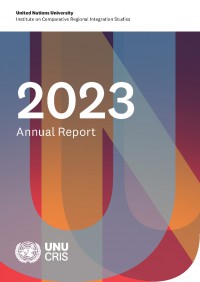
2023 was not a good year for humanity and world peace. Regional militarised conflicts were started, continued or flared up again. In addition, new and old tensions around disputed borders on all continents may be sowing the seeds for further expansion of conflict worldwide.
With the end of the Cold War, military expenditures as a percentage of world GDP had been halved in a matter of years and remained stable for almost three decades, slightly above 2% of world GDP (World Bank data). However, according to various sources, preliminary figures for 2023 and budget figures for 2024 show that military expenditures are on the rise again, not only in absolute terms but also as a percentage of world GDP. According to the latest SIPRI data, global military expenditure increased to 2443 billion USD in 2023, i.e. a year-on-year increase of 6.8% in real terms, reaching a level of 2.3% of world GDP (www.sipri.org).
Conflicts in various regions are causing human losses, suffering and destruction. Focusing on only three conflicts, the Israeli offensive in Gaza, following the Hamas attacks of October 2023, has already seen more than 33000 killed, double more than that injured, and over 75% of the population of Gaza is displaced (UNRWA). The current episode of civil war in Sudan started in April 2023 and follows decades of intermittent conflicts in different configurations. More than 8,6 million people are forcibly displaced, of which around 1,8 million fled to neighbouring countries (UNRWA/OCHA). Around 13000 deaths have been confirmed (UNOHCHR) but it is generally understood that this is a great underestimation. Finally, the Russian invasion of Ukraine in February 2022, eight years after the annexation of Crimea in 2014, has already claimed the lives of more than 10500 civilians and injured around 20000 more (UNOHCHR/HRMMU), to which tens of thousands of military casualties on both sides should be added, even if published figures diverge considerably. Ukraine counts almost four million internally displaced persons and around 6,5 million refugees worldwide (UNOHCHR).
UNU-CRIS contributes to a better understanding of the determinants of regional conflict and security and the roles of regional actors and institutions therein. There are currently research projects being conducted on regional security in West and East Africa, Eastern Europe/Eurasia, the Atlantic, and the Indo-Pacific. Our aim is not only to provide our UN colleagues and policymakers with rigorous analysis, but also to ‘arm’ citizens worldwide with data and arguments so that they can send the right (and strong) signals to their political leaders and authorities, namely: that they, and their children, live better lives with regional cooperation than with regional conflict.
In our research on regional security, our researchers are very much aware of the nexus between regional conflict/security, on the one hand, and human mobility, natural resources, health and the economy, on the other. This nexus approach characterises the research done at UNU as a whole. This is also reflected in the work that is done in and between the different clusters at UNU-CRIS: from migration & social policy to economic interactions, from digital governance to nature, climate & health. This annual report is testimony to this and shows the creativity and productivity of our research community in 2023.
In this annual report, I invite you to discover the main academic events of 2023, our research output in different formats, policy reports and briefs, our capacity building and outreach portfolio, our new faces and our growing network.
I must also share that this year, we also bid farewell to Louise Fawcett, who has been the chair of our advisory committee for the past 12 years. Louise has been a great source of knowledge, advice and strength for UNU-CRIS, and will be greatly missed. She leaves us in good hands, however, as Fukunari Kimura takes over as chair of the advisory committee from 2024 onwards, and we welcome new members Adebayo Olukoshi and Florian Trauner.
In keeping with our driving principle that our greatest challenges can only be solved together, we encourage you to reach out to us to explore collaboration and do not hesitate to subscribe to our newsletter to keep abreast of our work.
Philippe De Lombaerde
Director of United Nations University Institute on Comparative Regional Integration Studies
